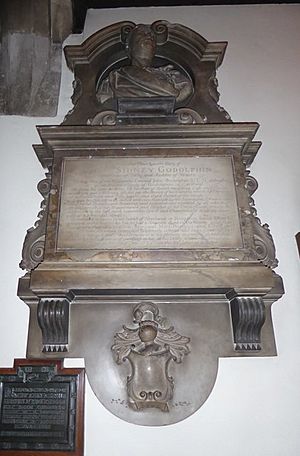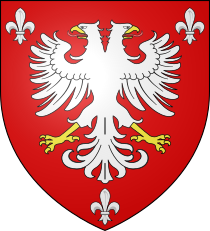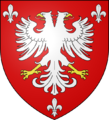Sidney Godolphin (colonel) facts for kids
Quick facts for kids
Colonel
Sidney Godolphin
|
|
|---|---|

Monument to Sidney Godolphin, Church of St Nicholas, Thames Ditton, erected by his youngest daughter Ellen
|
|
| Member of Parliament for St Germans |
|
| In office August 1727 – September 1732 † |
|
| Member of Parliament for St Mawes |
|
| In office April 1722 – July 1727 |
|
| Auditor of the Exchequer | |
| In office June 1702 – September 1732 |
|
| Governor of Scilly | |
| In office April 1700 – September 1732 |
|
| Member of Parliament for Helston |
|
| In office August 1698 to September 1713 – September 1715 to February 1722 |
|
| Member of Parliament for Penryn |
|
| In office April 1690 – November 1695 |
|
| Personal details | |
| Born | 12 January 1652 (baptised) London, England |
| Died | 30 September 1732 (aged 80) Thames Ditton, England |
| Resting place | Church of St Nicholas, Thames Ditton |
| Spouse | Susanna Tanat (married 1673-1723) |
| Relations | Earl of Godolphin (cousin) |
| Children | Margaret, Tanat, Mary, Penelope, Elizabeth, Ellen |
| Parents | John Godolphin (1617–1678); Mary Tregose |
| Alma mater | Inner Temple |
| Occupation | Soldier and politician |
| Military service | |
| Allegiance | |
| Rank | Lieutenant Colonel |
| Unit | Granville's Regiment of Foot |
| Battles/wars | Glorious Revolution Nine Years War Siege of Namur |
Sidney Godolphin (1652–1732) was an important English figure who was both a soldier and a politician. He served as a Member of Parliament (MP) for many years, from 1685 until his death in 1732. An MP is a person elected to represent a group of people in the country's main law-making body, called Parliament.
By 1730, he became the Father of the House, which is a special title given to the longest-serving MP in the British Parliament. He also reached the military rank of Lieutenant Colonel and was the Governor of Scilly from 1700 until he passed away.
Contents
Who Was Sidney Godolphin?
Sidney Godolphin was born in London, England, and was baptized on January 12, 1652. He was the only son of John Godolphin (1617–1678), who was a well-known English jurist (a legal expert or judge) and writer. Sidney's mother was Mary Tregose, John's second wife.
His father, John Godolphin, had many children from four marriages, but only Sidney and two of his half-siblings lived past childhood. The Godolphin family was one of the richest in Cornwall, a county in southwest England.
His Family's Role in History
During the Wars of the Three Kingdoms, a series of conflicts in the 1600s, Sidney's father supported Parliament. This was different from some of his cousins, who were Royalists and supported the King. For example, his cousin Sidney Godolphin (a poet) was killed in 1643 fighting for the Royalists.
After the King returned to power in 1660, John Godolphin became the King's Advocate, a legal role advising the King.
Sidney's Family Life
In 1673, Sidney Godolphin married Susanna Tanat (1650-1723). She was from Shropshire, another county in England. They had one son named Tanat, who sadly died young in 1696 while serving in the military in Flanders.
They also had four daughters: Mary, Margaret, Ellen, and Penelope.
Sidney Godolphin's Career
Sidney Godolphin started studying law at the Inner Temple in 1668. The Inner Temple is one of the four professional associations for barristers (a type of lawyer) in London.
Early Military and Political Steps
In June 1685, he became a captain in the Earl of Bath's regiment. This army unit was created by King James II after a rebellion. In the same year, he was elected as an MP for Helston, a place where his family had a lot of influence.
In August 1688, his regiment was sent to Plymouth, an important port city. The Earl of Bath, who was in charge of Plymouth, decided to support William of Orange when he arrived in England during the Glorious Revolution in November 1688. This revolution led to King James II being replaced by William and Mary.
In 1689, Godolphin helped secure Guernsey, an island, and served there as Lieutenant Governor for about a year.
Serving in Parliament and Abroad
In March 1690, he was elected as an MP for Penryn. In April, he was made Lieutenant-Governor of the Isles of Scilly. His family had owned these islands since the late 1500s.
For the next three years, he spent most of his time in Parliament, usually voting to support the government. In February 1694, he was promoted to Lieutenant Colonel and went to Flanders (an area that is now part of Belgium) to serve in the military. He was captured by French soldiers in June 1695 during the Siege of Namur.
It's not clear how long he was a prisoner, but he missed the election in November 1695. He left the army in 1696.
Later Political Roles
In August 1698, he was elected as an MP for Helston again and kept this seat until 1713. In April 1700, he took over from his cousin, the Earl of Godolphin, as Governor of Scilly. He also became a major in the Queen's regiment as the country prepared for the War of the Spanish Succession.
However, he left the army in early 1702 due to his health. In June, he was appointed Auditor of the Exchequer for Wales. This was a financial role, and his wife owned land there.
He was generally seen as part of the Whig political group. In 1709, he voted to remove a minister named Henry Sacheverell from office. Even though the Tory party gained a lot of power in the 1710 election, Godolphin kept his seat. However, he lost it in September 1713 when the Tories gained even more.
Becoming Father of the House
When George I became King in August 1714, the Whig party became very powerful for almost 50 years. Godolphin regained his seat in Helston in March 1715. He then represented St Mawes in 1722 and St Germans in 1727.
Because he served in Parliament for so long, he became the Father of the House. Even though he had this important title, he didn't leave many records of his speeches or actions in Parliament.
His Final Years
In 1723, Sidney Godolphin bought a house in Thames Ditton. He passed away there on September 22, 1732, and was buried in the Church of St Nicholas. His youngest daughter, Ellen, inherited most of his property and had a detailed monument built in the church to remember him.
Images for kids
-
Monument to Sidney Godolphin, Church of St Nicholas, Thames Ditton, erected by his youngest daughter Ellen
 | DeHart Hubbard |
 | Wilma Rudolph |
 | Jesse Owens |
 | Jackie Joyner-Kersee |
 | Major Taylor |




